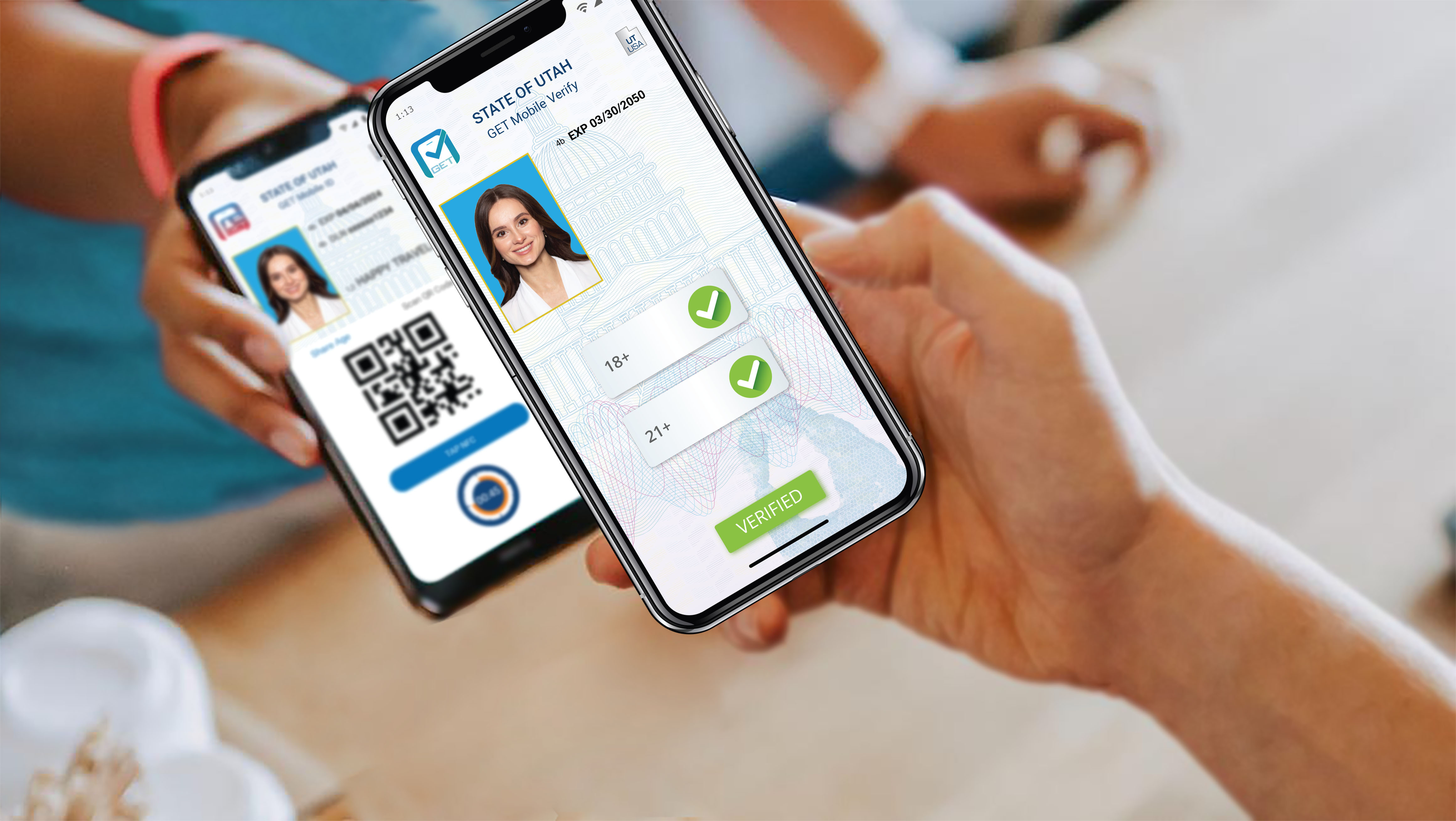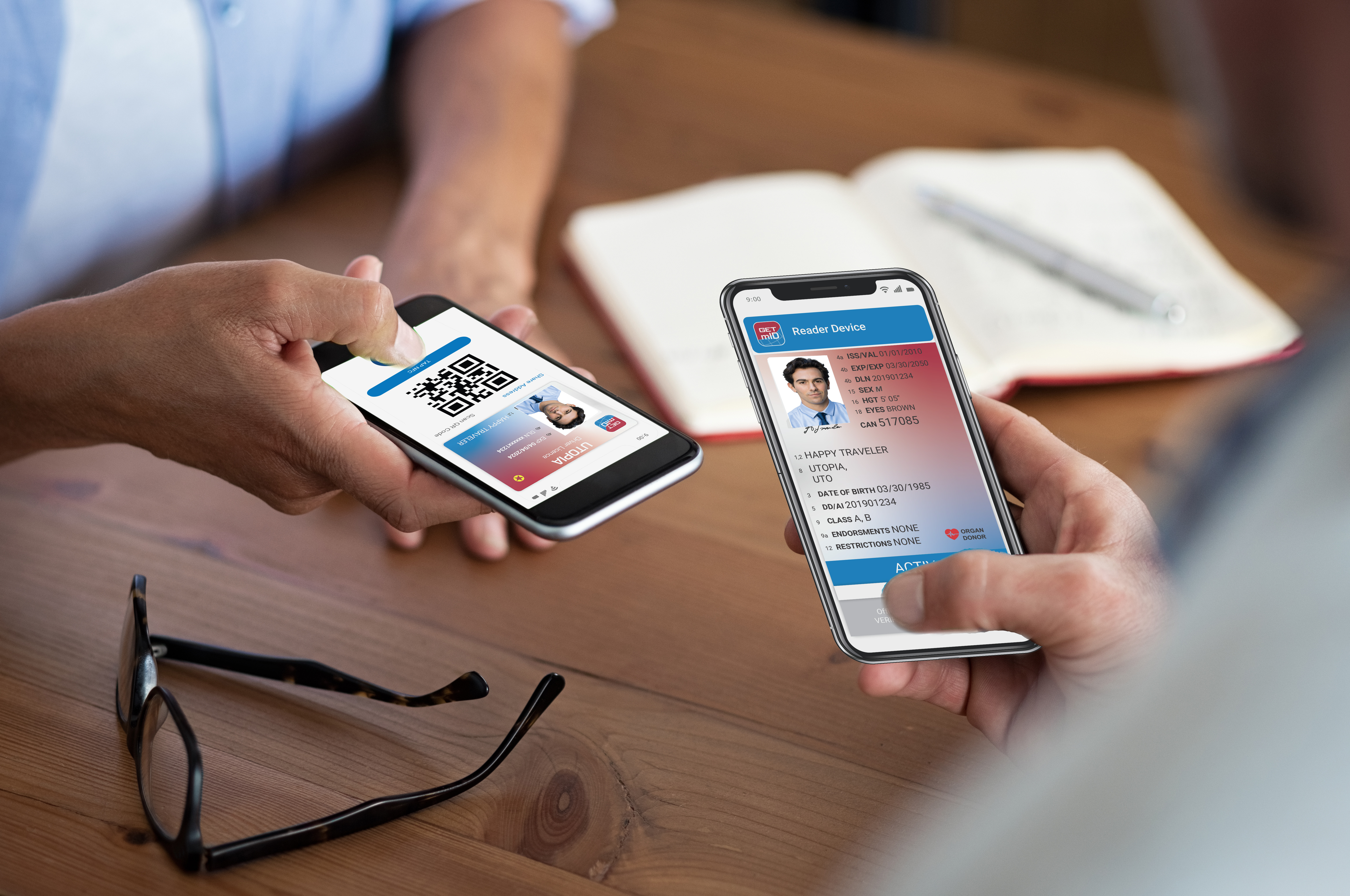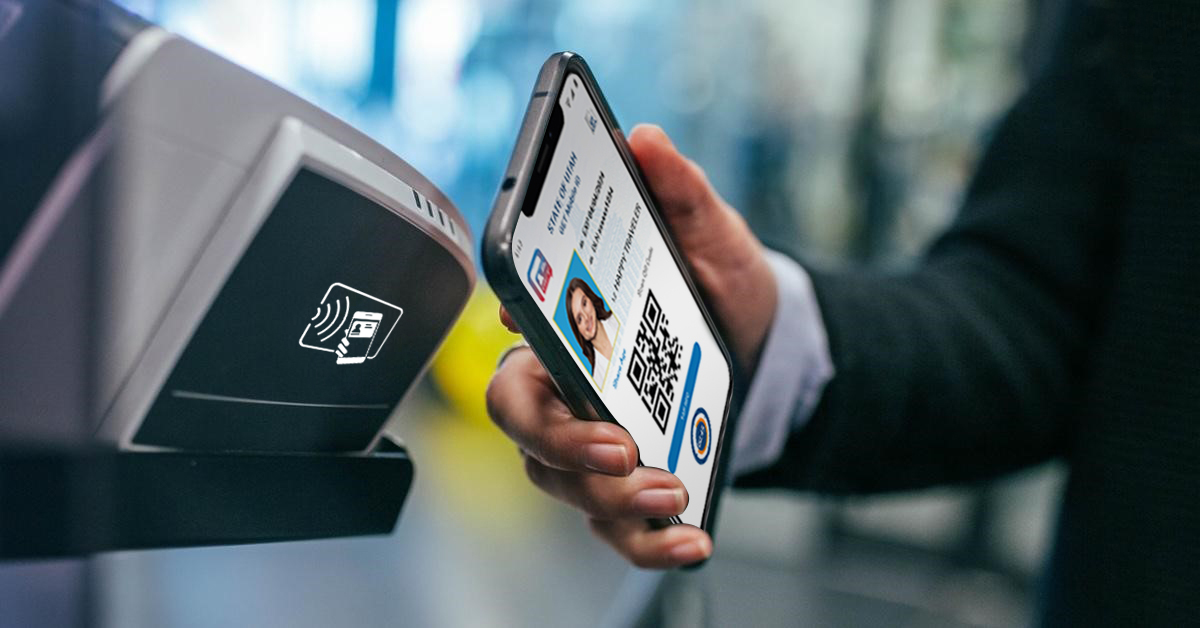Imagine you're doing a notarization. A signer offers you their driver's license and you want to confirm it's genuine. You touch the ID with your phone and a message from your state DMV confirms the license is valid.
It may sound like future tech, but you may see it sooner than you think. Remote notarization introduced the public to technology-driven methods to identify signers such as knowledge-based authentication (KBA). Now, a handful of states are rolling out a new concept called "mobile ID" — an identification document stored on a mobile device. A mobile ID can be verified by scanning a QR code or barcode, or through wireless contact by touching two phones together.

Image courtesy GET Group North America
Movers and shakers in online commerce are taking note of the potential of mobile IDs (mID). Tech giant Apple announced in September that it is working with several states to permit residents to identify themselves with mobile IDs on Apple devices. A small number of states are issuing mobile IDs, and remote notarization platforms are exploring how to use mobile IDs to identify signers for remote online notarization (RON).
Despite its potential, there's still a hurdle mobile IDs have not yet overcome — widespread state adoption and trust and acceptance by Notaries. Only a few states currently have explicitly authorized these mIDs and those that have are in the early implementation phase. Very few Notaries have encountered them and there are questions about their use cases, verification and security features. The National Notary Bulletin recently discussed mobile IDs with a few Notaries and addressed some key issues and questions about the emerging technology.
What is a mobile ID, and how does it work?
An mID is a secure, digitized version of a physical identification document — such as a driver's license or nondriver identification — that is issued to an individual by a state agency and installed on the individual's mobile device.
Typically, a person issued a mobile ID must already have a physical driver's license or state-issued ID card. To get an mID, an individual typically must download the state issuing agency's official iPhone or Android app on their phone, scan the front and back of their physical ID and verify their identity. Once installed, the holder can then access the mobile ID via their fingerprint or another secure access method like a PIN number.
A mobile ID holder can choose to display specific information on a mobile ID and keep other information private if desired. For example, a person could choose to display their date of birth to verify their age and keep the other information — such as their address — hidden.
Which states are currently issuing or testing mobile IDs?
Currently, mobile IDs are being issued or tested in Arizona, Colorado, Delaware, Iowa, Oklahoma, Utah and Wyoming.
Apple has announced plans to allow residents of Arizona, Iowa, Oklahoma and Utah to use mobile IDs through Apple's Wallet app for iPhones. Apple also said they are working with state officials in Connecticut, Georgia, Kentucky and Maryland to implement similar mobile ID programs through the Wallet app in those states soon.
Florida has passed a law authorizing mobile IDs, but as of November 2021 has not started issuing them to the public yet.
Can Notaries accept a mobile ID as proof of a signer's identity?
It depends on the state. Colorado, which first started issuing mobile IDs in 2019, has instructed Notaries not to accept mobile IDs from signers until the Secretary of State's office issues official guidance. Delaware's state Notary Public office says their Notaries may accept a Delaware-issued mobile ID as proof of a signer's identity. "Whether a Notary accepts a mobile ID is left to the discretion of the Notary," said Rony Baltazar-Lopez, Community Relations Officer with the Delaware Department of State.
A few states that do not issue mobile IDs, such as Ohio, have indicated that their Notaries can accept a mobile ID from another state provided it meets all other statutory ID requirements. In states without signer identification guidelines, it would be the Notary's choice to accept or refuse a mobile ID.
Dale Gibson, a Utah Notary for 16 years, hasn't accepted a mobile ID during a notarization — but he has one himself. He is part of a pilot program in the state of Utah to test the viability of mobile IDs.
Gibson notes that there's "a lot of security" on his mobile ID, but when asked if he'd accept one during a notarization, he hedged. "Yes … with reservations," he said. "If the mobile ID was issued in Utah, I would. I'd probably not accept a mobile ID from another state. Once mobile IDs are more widespread, I'll accept them."
However, he expects the rollout to be a "long road."
How do you confirm a mobile ID is real?
The biggest concern Notaries raised about mobile IDs is making sure the ID isn't faked. Many Notaries mentioned counterfeit physical IDs made with printers and image editing software that are hard to spot. These Notaries fear a fake mobile ID would be even harder to detect.
"I prefer a physical ID," said Alisa Waxler, a Texas Notary authorized to perform remote online notarizations. "During a RON, I ask the signer to show a physical ID while in a session so I can see it in their hand. They also go through KBA and electronic ID validation. But it took me a long time to accept this as a new way of identification for signers."
"I know things are going digital and remote, but I'm still leery," said Wendy Gosnell of Alabama. "I want to hold the ID. There are too many opportunities to commit fraudulent acts by unscrupulous signers at the Notary's expense."
Mobile ID technology experts are quick to reassure Notaries that mobile IDs have multiple security features to confirm their authenticity.

Image courtesy GET Group North America
First, an mID is not simply a picture of a driver's license stored in the photo app on the person's phone. No Notary should ever trust that. Using the Arizona Department of Transportation (ADOT) mID implementation as an example, the driver's license instead must be installed using ADOT's official app and the individual must verify their identity, including passing a facial scan comparing a selfie and the photograph on the person's ID, before the agency provisions the mID in the app on the person's mobile device.
Each piece of information on a mobile ID is encrypted separately and contains security measures that allow a person verifying the mobile ID to confirm it is valid. With the Arizona mID, the individual's photo on their mID moves from side to side and a visual hologram can be rotated to verify the authenticity of the mID. This is comparable to a Notary using a blue light to inspect security features on a physical ID today.
There are several ways a Notary can view a person's mID. The person can show the actual mID on their mobile device to the Notary, much like producing one's physical ID today.
Some mobile IDs generate a QR code that a Notary can then scan using an app on their own phone. Once the code is scanned, the mobile ID data is checked against the information in the issuing state agency's database and the ID will display the date the information was last updated and its status as "active." A Notary using the app can specify the exact information they want to see from the ID, which then can be used to satisfy their state's satisfactory evidence of identity requirement and to record the information in their journal.
Some states also enable verifiers to use a scanning device or a secure website and webcam to scan the QR code and check the mobile ID.

Image courtesy GET Group North America
Other mobile IDs can even be validated like "tap" credit card payment devices used at gas stations and other businesses, simply by touching the bearer's and verifier's phones. This creates a wireless connection between the two phones, allowing the app on the verifier's phone to verify the data from the bearer's mobile ID.
What if a mobile ID is lost or stolen?
Colorado Notary Adrienne Gomez said that she expects that mobile IDs will be a part of notarizations in the future, but noted, "Mobile IDs are uncharted territory." She worries about what would happen if a person with a mobile ID lost their phone or had it stolen.
"It's a good question," said David Kelts, Director of Product Development, Mobile ID, with the technology company GET Group North America. "Our mobile ID uses a PIN or biometric identifier to unlock access to the mobile ID, so that it's difficult for someone else to use it."
Kelts added that if a phone is lost or stolen, the owner can request the phone be wiped by the device provider to prevent anyone else from accessing the mobile ID. "When the person registers for a replacement mobile ID with a new phone, we would request some additional security measures, deactivate the mobile ID on the old phone, and move it to the new phone."
IDEMIA, the technology provider for mobile ID programs in Arizona, Delaware, Iowa and Oklahoma, requires mobile ID bearers to create a PIN, register their phone number and take a photo of themselves in order to use IDEMIA's mobile ID app. The selfie is checked against the bearer's actual photo that is on file with the DMV, said John Doyle, IDEMIA New Market Development. "When a mobile ID is used to verify identity online, we use facial matching to ensure the person presenting the mobile ID is the same person that originally enrolled with the state DMV," he said.
What does the future look like for mobile ID use?
While only a few states are issuing mobile IDs at present, there may be more soon. A set of standards for security and use of mobile IDs was approved and published at the end of September by the International Organization for Standardization, which develops guidelines for technology, commerce and industries worldwide.
To address Notary concerns, the upcoming revision of the NNA's Model Notary Act scheduled next year will include guidance for the secure use and acceptance of mobile IDs during notarizations, according to NNA Vice President of Government Affairs Bill Anderson.
"The revision of the Model Notary Act will authorize Notaries to accept an electronic driver's license or state identification provided it is made available by the state agency that normally issues these IDs," Anderson said. "When identifying a signer for a notarization, the Notary can trust that the mobile driver's license or mobile ID is valid at the moment it is presented because it comes straight from the source."
To try out the practical use of mobile IDs during notarizations, a pilot program to test the security and effectiveness of mobile IDs for Notaries is scheduled this fall in Arizona by technology vendor eNotaryLog, LLC.
"Mobile driver's licenses and IDs may become a powerful tool for Notaries to identify signers in coming years," said Tim Reiniger, legal counsel for eNotaryLog, LLC. "It's very difficult to forge a mobile ID because the data on the ID is encrypted, and its authenticity is easily verified. While a physical ID is only updated once every few years, and the bearer's appearance can look very different in that time, with a mobile ID a person can have changes to their information such as a new address or new photo updated very quickly."
Remote online notarization providers are also exploring whether mobile IDs can be integrated into RON as a secure way to identify signers.
"eNotaryLog is rushing to integrate mobile IDs in the remote online notarization process because they enable up to three factors or processes for authenticating signers," Reiniger said. "In most states, RON requires at least two forms of identity proofing to confirm a signer's identity. Mobile IDs enable additional identity proofing processes that are ideal for RON providers and signers."
Pat Kinsel, CEO of the remote notarization platform Notarize, said that mobile IDs bring a lot of potential benefits but also considerable challenges.
"For it to work, a mobile ID will need to be accepted across state lines and at airport security checkpoints no matter where you go, just like a physical ID works today. This will require not only mass adoption and acceptance but intergovernmental cooperation — it's a huge undertaking," Kinsel said. "But Notarize is generally excited about this development. We think mobile ID is a step in the right direction for the future of digital identity. When mobile ID reaches mass adoption, I think we will be able to explore new innovations in identity verification for RON."
David Thun is the Editorial Manager with the National Notary Association. C.A. Wolski is a freelance writer.
Related Articles:
The 3 Ways Notaries Can Properly Identify Signers